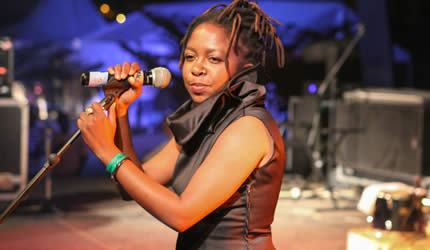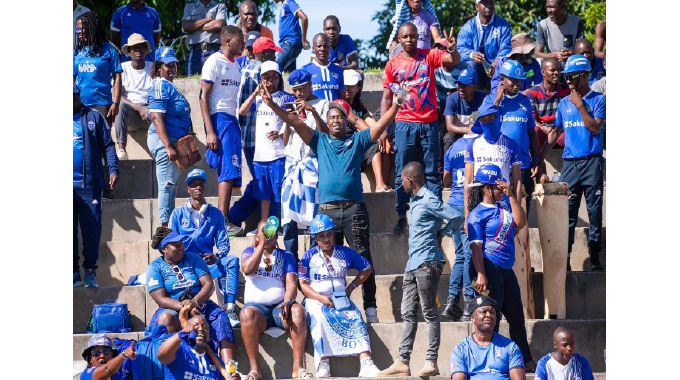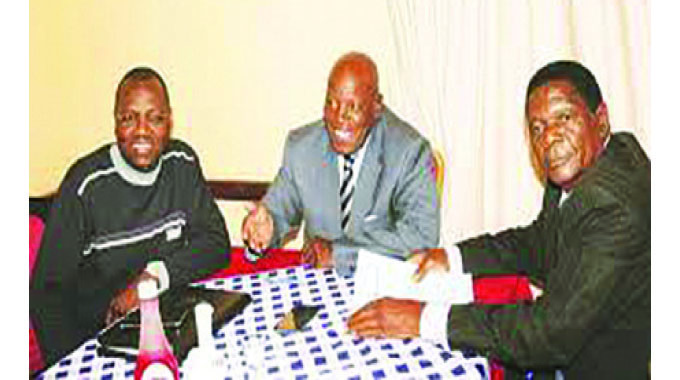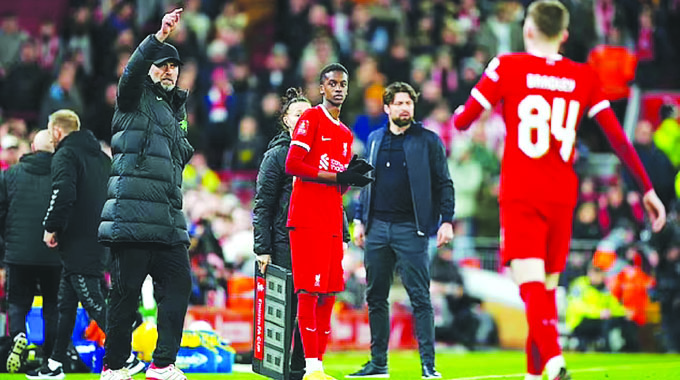Pagels was a blunder and the mere fact he was European didn’t make him a better coach than Gishon Ntini
KLAUS Dieter Pagels showed his class on Thursday, inviting a select group of football writers who had worked well with him during his short stint in charge of the Warriors, to a farewell luncheon at a Harare hotel. Over a meal, the German coach said goodbye to men and women who had helped him communicate his vision of tiki-taka football to a nation that didn’t know him and how he had suddenly become their national coach.
You have to give it to Pagels, for his sheer class, to remember the guys who had helped him preach his gospel – the short passes, the quick movement, the building of play from the back, in short, the tiki-taka revolution.
Given the circumstances surrounding how his romantic flirtation with the Warriors had abruptly ended, replaced by Ian Gorowa when he had already made plans to guide the team in Mauritius this weekend, one would have expected Pagels to have a considerable degree of bitterness.
If he had that bitterness, he didn’t show it and, like a true professional, he toasted his departure to a group of men and women who had helped him spread his football gospel in a seven-month period in which his profile underwent a rapid transformation.
But for all his class, which he showed right up to the end, Pagels was hopelessly out of depth with the demands of football, at national team level, and that we even had the temerity to trust him with dancing with our Warriors provides a graphic illustration of how much we have fallen, as a football nation, over the years.
To give Pagels the torch to guide the Warriors, even as poor as they have become in recent years, was tantamount to asking Pokello to be the coach of the Mighty Warriors simply because she coaches her son, Nathan, football and wants him to play in the English Premiership one good day.
One can’t suddenly jump into the hot seat of coaching a national team at the age of 63, especially against a background where he has no relevant back-up experience at club level, and we had the disastrous scenario where Pagels was doing his apprenticeship, at such a ripe age, using the Warriors as a learning curve.
Pagels is only five years younger than his fellow German, Josef “Jupp” Heynckes, who announced his retirement from football this year after leading Bayern Munich to the Champions League title, his second success story in the tournament after winning it with Real Madrid, and with three Bundesliga titles under his belt.
Pagels and Heynckes are from the same generation and the sharp contrast in their profiles, one winning so much at the highest level and the other with no traceable history in this game until he surfaced in Zimbabwe as national coach, provides the answer to why our experiment with him was so horrible it was always doomed to fail.
A look at the six competitive matches that Pagels was in charge of the Warriors, three World Cup and three Cosafa Cup ties, paints a story of technical shortcomings, some so basic, they would have been expected from those teachers who took charge of their teams at the Copa Coca-Cola football festival in Mutare two weeks ago.
They say a good coach is seen by the way he organises his team in the second half, after a critical analysis of the opposition in the first period, their weaknesses and their strengths, and in all our three World Cup qualifiers under Pagels, our worst performance came in the second half.
In Alexandria, against Egypt, we were matching the Pharaohs well in the first half and we were at par 0-0 at the interval, but in the second half we lost a big chunk of our competitive spirit, we lost the shape we had and conceded two goals.
At home, against the Pharaohs, we didn’t fare any better and conceded another two goals after the interval, in a humiliating 2-4 whipping, the highest number of goals we have given away to an opposition team in either a World Cup of Nations Cup tie on home soil.
The dead rubber in Conakry, against Guinea, won’t provide a good barometer for our analysis, given the shambles that accompanied the Warriors’ travel arrangements, but the Cosafa Cup quarter-final, against Malawi provided the best demonstration of Pagels’ severe technical shortcomings, especially in reading the game in the first half, and why he was more of a misfit than a missile.
After our tiki-taka flowed, for once, in that first half and we led 1-0, the football gods appeared to give us a helping hand when Malawi were reduced to 10-men, just before the break, which should have given us the freedom to impose our superiority.
But the Warriors somehow lost their way as Malawi won the tactical battle, with one-man short, and just dropped one of their forwards into a midfield position and they were the better team for the last 45 minutes and, true to the way we played under Pagels, we even conceded in that second half to force the game to penalties.
The Irony of Champions Celebrating Coming Second
Admittedly, the Warriors competed well in Zambia but that is what we should expect, we were the defending champions for Christ’s sake, we were the record winners of the tournament, we pride ourselves as having the best players in our local Premiership and, with South Africa keeping the Kaizer Chiefs and Orlando Pirates stars out of their team, we were the favourites.
We lost that final because our ’keeper didn’t settle in the big occasion, our coach failed to see the early signs that were there in that first game against Malawi that our ’keeper had an Achilles Heel when it came to cutting crosses and dead balls that came in at height, and we paid a huge price for taking the best ’keeper in the domestic Premiership today, Tafadzwa Dube, and turning him into a tourist in Zambia.
We conceded in all the three games we played in Zambia, and it didn’t take Lesotho four minutes to get a goal against us, which continued a worrying trend, under Pagels, where the Warriors have conceded in every competitive game they have played in three World Cup qualifiers and three Cosafa Cup ties.
It’s easy to comfort ourselves that our boys reached the final in Zambia, and derive satisfaction in that as if it was an improvement, as if they had lost in the semi-finals in the last tournament, and take all this as steps going forward instead of steps going backwards.
But the reality is that we won just one match in Zambia, in regulation time, and it had to come against a team like Lesotho, who conceded 11 goals in two away games in their 2014 World Cup qualifiers against Ghana and Zambia, failed to beat a Malawi team, which played with 10-men for 45 minutes, in 90 minutes, and lost to Zambia.
At the end of April, Pagels took his men to Zambia for a friendly international against the same Chipolopolo side and they lost 0-2, three months later they returned to face the same opponent in the Cosafa Cup final and the scoreline was the same and, on both occasions, they conceded a goal in either half which, clearly, suggests we learnt nothing from the earlier trip.
For me, that’s where Pagels came frustratingly short, his failure to read the opposition.
After impressing in Alexandria, the Warriors were woeful, against the same Pharaohs, in Harare and the margin of defeat was doubled, he learnt nothing from his friendly against Zambia and, somehow, had blinkers which appeared to distract him from the technical shortcomings that we were all seeing in his trusted ’keeper.
He is gone now, and there are thousands of Zimbabwean football fans who will feel disappointed that he wasn’t given enough time to complete his journey, and it’s a measure of how we have fallen as a football nation that a coach who wins just one competitive game, out of SIX matches, and loses all his three World Cup qualifiers, can still evoke strong feelings of sympathy, let alone support.
A coach who was so blind that he can’t see any value in Willard Katsande, the standout defensive midfielder in the South African Premiership, playing for the champions there, but at the same time had the “vision” to see the value of those who could not make even their teams in that same league.
A coach who, against all wisdom, saw exceptional leadership qualities, on a national scale, in Denver Mukamba, and made him Warriors captain, even if he wasn’t good enough to play for his first XI against the Pharaohs here.
Pagels was a blunder, as monumental as they come, and the mere fact that he was European, and from Germany, didn’t make him any better coach than Gishon Ntini, who can point to a better profile at CAPS United, where he helped them win the championship and guided them in the Champions League, and Triangle where he ended their 42-year-wait for top-flight action.
As a technical expert, one who concentrates on nurturing the grassroots and developing women’s football, he scored high points and he worked tirelessly in that field, but there is a huge difference between working with the schoolboys and working with the best footballers a nation can get and hoping that Pagels would deliver was just as unlikely as expecting Stunner to write a nice song, today, praising Elikem as a handsome and charming man.
As Another Coach Comes in,
We Can Only Wonder
Ian Gorowa is the latest man to be given a chance to coach the Warriors, the seventh coaching appointment by our football leaders in the past 42 months which, as Lawrence Moyo rightly put it in The Herald yesterday, translates to a coach every six month.
That’s as close to a world record, or a place in the Guinness Book of Records, as our Warriors have come and, maybe, in terms of football associations, it’s very likely that this is, in itself, a first in world football with one association making seven appointments in three-and-half years.
I like Dibango’s youthful enthusiasm and he spoke well in his first address to our media, respecting those who scaled Mount Everest like Sunday Chidzambwa and Charles Mhlauri, by taking us to the Nations Cup and saying they provide the inspiration, the benchmark, the heights that he wants us to scale.
In any given situation, if I had a choice between Pagels and Dibango, I would go for the latter simply because he has been in the trenches before, in the pressure cooker of coaching a demanding team like Mamelodi Sundowns, and knows exactly what he is plunging himself into unlike Klaus whose every step was experimental, clearly jittery, like a baby learning to walk.
For us to say Dibango doesn’t have the quality to coach a team, which we gave to a man who had never coached a Division One team in his country and is going back to teach schoolboys for the next six months, will be grossly unfair.
The point is that if we are the same country that embraced Peter Ndlovu, as an assistant coach of the Warriors, we can’t find faults in the appointment of Dibango, to lead the Warriors, and we only need to look at the two coaches’ connection with Mamelodi Sundowns to find the reason.
King Peter has been drafted into the backroom coaching staff of Sundowns, where he will learn the ropes and develop his coaching skills, not as the number two to head coach Pitso Mosimane, a position held by Alex Bapela, but somewhere down the order in a set-up that also has Zipho Dlangalala (assistant coach), Jon Ibarolla (’keepers coach) and Trott Moloto (director of football).
Two years ago, between February and May 2011, Gorowa actually headed that Sundowns coaching staff, was the boss in the house, and ended the season just two points behind champions Orlando Pirates after two depressing results, in the last four matches, in KwaZulu Natal against Amazulu (1-1) and Maritzburg United (1-3).
After his boss, Antonio Lopez Habas, had been fired as the championship bid went off track, Gorowa took charge and in the remaining 14 league games, he won eight, drew three and lost three, all away from home, and if he had just converted one of the draws into a win, especially that 4-4 against Ajax Cape Town, he could have been champion.
In those 14 games, Mushekwi scored nine times.
But all this is not my main point, really, because with every new coach that is being appointed by our football leaders, we can only wonder and imagine what would have been of our national team if we had given a chance to the project that Norman Mapeza was building, that team which on June 5, 2011 beat Mali 2-1 at Rufaro.
Just rewind to that afternoon, for a moment, and you will see a national game at peace with itself – that capacity crowd (I have included a picture on this page to illustrate that point), the incredible life in the stands, Vietnam singing, the other bays joining in the chorus, the colour in the bays, the grand expectations among our fans.
Remember the explosion of emotions when Khama Billiat streaked clear on the left and his spectacular effort went home, the sheer disappointment that followed the cruel decision to flag him offside, the waves of questions that flooded back in our minds as we asked – Why Always Us?
Remember that explosion of joy when Knowledge Musona fired us ahead with a beauty of a goal, the way we hugged each other, soaked in the golden moment, felt so proud to be fans of this team, so proud to be Zimbabweans, so happy that the Smiling Assassin was one of us, so privileged to be witnesses?
Remember the disappointment that followed the Mali equaliser, the silence inside the stadium, the emotional haemorrhage, the immense pain it inflicted on all of us, the way our souls were battered by that one moment?
Then, from there, it was just hoping, praying, cheering, Musona got a golden chance with a header, and we were all up in the air, 35 000 of us rising like a phoenix then slumping back into our seats when reality struck that we had missed, the waves of questions that flooded back in our minds –
Why Always Us?
They say where there is a will, there is a way and, in time added on, Ovidy Karuru, our outstanding player by a distance, stormed into the box, Rufaro held its breath, and so did a nation watching this live on television, the silence was deafening, maybe now we thought, and down he went, under that challenge – PENALTY!!!!!
Musona takes it, the ’keeper saves, the waves of questions flood back in our minds – Why Always Us?
There is a reprieve, the ’keeper has moved, the kick has to be retaken and this time Musona is dead accurate and there is a Mother Of All Explosions at Rufaro they can even hear us, at that very moment, in Highfield, you needed a Richter Scale, to measure that sound, loud enough to have triggered some movement below the surface.
For me that was the team and if we had nurtured it, developed its coach in-house, supported him the way he was being supported by the fans, given him the freedom to wave his magic, I can tell you that we would not only have qualified for the 2013 Nations Cup but even gone past the group stages and we would not have been having just a point, out of a possible 15, in our World Cup campaign today.
But we destroyed that team, tried to destroy their coach, destroyed the fans’ dream and everything else, since then, has been downhill, one way, and we are not even Cosafa Cup champions anymore, can you believe it?
It Feels Good When You Get it Right
Last week, ahead of the Cosafa Cup final, I had something about midfielder Devon Chafa, saying the more that I see him develop, the more I believe he is destined for bigger things in the future and I wrote:
“It’s also about Devon Chafa, the player I believe, in my little book, will make the biggest impact, in terms of success as both an international, and a professional in foreign lands, among his current generation, because he is a natural and his development, in the past year, has been phenomenal and the more confident he becomes the more his quality will shine.”
Well, Chafa was named man-of-the-match in that Cosafa Cup final, despite the Warriors going down 0-2, which was a huge vote of confidence in his skills, given that he was deemed to have outshone everyone in the Zambian team, despite playing for the side that lost.
Even Pagels, in his parting shot with reporters on Thursday, acknowledged Chafa’s qualities.
“Zimbabwe have a lot of talented young players and if they have money to go to the rural areas they (will) find more good players such as Devon Chafa,” he said.
And, boy oh boy, this Chafa bloke can speak good English, so calm, so authoritative, so fluent he sounded, in his post-match interview live on SuperSport, like the best student from the Havard Law School, than just an ambitious emerging football player.
In that short interview, Chafa showed the world just why those who rank us as the most literate nation in Africa are not a group of mad individuals.
Well done young man and, as Winky D will sing, “Takaipa, Takaipa, Bvunza vakazvinwa paSuperSport Africa, Devon anga aripahasha mumwe munhu aifa.”
Text Feedback Of The Week
Hi, Rob!
I’m just listening to Sportsline with Mike and Barry, arguably the best young sports analysts in the land. They can easily walk into SuperSport or SkySports studios. They are good on both international and local sports news. Can you please give these young guys, maybe, a blog in your sports pages, something like “Mike and Barry on Monday”, if possible? – Harmony Gwaure, Chitungwiza.
To God Be The Glory
Come on United!!!!!!!!!!!!!!!!!!!!!!!!!!!!!!!!!!!!!!!
Chicharitooooooooooooooooooooooooo!
Text Feedback – 0772545199
WhatsApp Messenger – 0772545199
Email – [email protected]
Skype – sharuko58
Twitter – @Chakariboy
You can also interact with ROBSON SHARUKO on Facebook and Viber or read his material in The Southern Times.







Comments